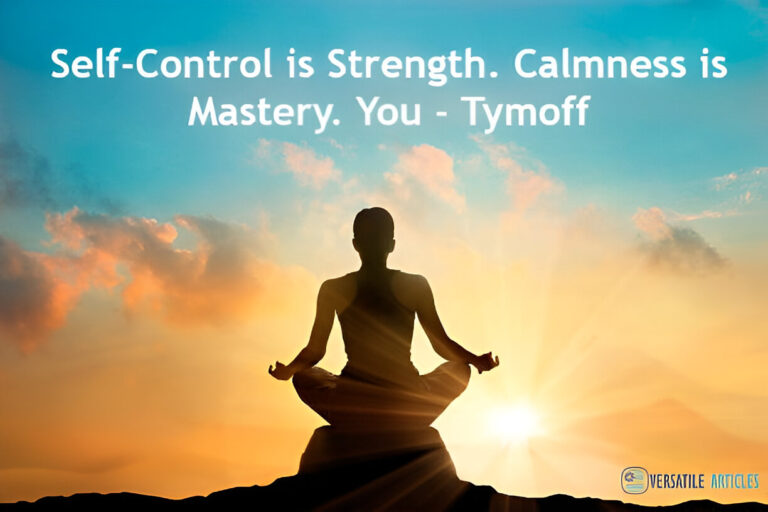Introduction
In a world filled with distractions and challenges, mastering self-control and maintaining calmness can transform your life. As Tymoff insightfully puts it, Self-Control is Strength. Calmness is Mastery. You – Tymoff This powerful phrase encapsulates the essence of emotional intelligence and mental resilience. In this article, we’ll delve deep into this philosophy, exploring its importance, benefits, and actionable ways to implement it in daily life.
Why Self-Control is Strength
Self-control is more than resisting temptation; it’s about directing your energy toward meaningful goals. This strength allows you to:
- Make Better Decisions
Impulsive decisions often lead to regret. With self-control, you pause, reflect, and choose wisely. - Achieve Long-term Success
Many achievements require persistence. Whether it’s saving money, building relationships, or pursuing a career, self-control helps you stay focused. - Improve Relationships
Reacting calmly in emotional situations fosters trust and respect. Emotional outbursts can damage connections, while measured responses build bridges.
Example: Research by the American Psychological Association highlights that people with higher self-control experience greater life satisfaction.
Calmness is Mastery: The Art of Staying Composed
Calmness is not about suppressing emotions but mastering them. When calm, you can:
- Handle Stress Effectively
Calm individuals tackle challenges without panic, making them excellent problem-solvers. - Improve Physical Health
Chronic stress impacts health. Calmness reduces stress hormones, improving heart health and immunity. - Enhance Mental Clarity
A calm mind thinks clearly, enabling better creativity and decision-making.
Insight: A study by Harvard Medical School shows that practicing mindfulness to enhance calmness improves focus and emotional regulation.
How to Cultivate Self-Control and Calmness
Implementing these virtues in your life requires effort and consistency. Here’s how:
1. Practice Mindfulness
Meditation and deep-breathing exercises train your brain to pause and reflect. Apps like Calm or Headspace can help.
2. Set Clear Goals
Know what you want to achieve. Clear objectives keep you motivated and disciplined.
3. Embrace Delayed Gratification
Waiting for rewards fosters patience and strengthens self-control.
4. Adopt Positive Affirmations
Repeating phrases like “I am in control” reinforces belief in your ability to stay calm and focused.
5. Learn from Role Models
Leaders like Mahatma Gandhi and Nelson Mandela showcased remarkable self-control and calmness, inspiring millions.
The Tymoff Connection
Tymoff’s emphasis on self-control and calmness stems from timeless wisdom. By combining these virtues, you can lead a life of strength, clarity, and purpose. Tymoff encourages embracing these traits to navigate the complexities of modern life with grace.
Benefits of Living by the Philosophy
Adopting Self-Control is Strength. Calmness is Mastery. You – Tymoff transforms your perspective and quality of life:
- Personal Growth
You become more self-aware and disciplined. - Professional Success
Staying composed under pressure boosts your credibility and performance. - Better Relationships
Emotional stability nurtures trust and understanding in personal and professional connections.
Resources for Deeper Learning
To expand your understanding, explore these valuable resources:
- Mindfulness for Beginners – A guide to practicing mindfulness.
- Emotional Intelligence and Success – Learn how emotional intelligence contributes to leadership.
- Stress Management Techniques – Tools to reduce and manage stress effectively.
Conclusion
Self-Control is Strength. Calmness is Mastery. You – Tymoff, These words by Tymoff are not just a philosophy but a guide to a balanced and powerful life. By understanding and applying these principles, you can unlock your true potential and face challenges with resilience and grace. Start today, and witness the transformation within yourself.
FAQs
Q1: What does Tymoff mean by “self-control is strength”?
A1: Tymoff emphasizes that self-control allows individuals to resist impulsive behaviors and focus on their goals, showcasing true strength.
Q2: How can calmness lead to mastery?
A2: Calmness helps you think clearly, manage stress, and respond thoughtfully, enabling you to handle situations more effectively.
Q3: How can I improve my self-control?
A3: Practicing mindfulness, setting goals, and embracing delayed gratification are effective ways to enhance self-control.
Q4: What are the health benefits of staying calm?
A4: Calmness reduces stress, improves heart health, boosts immunity, and enhances overall well-being.
Q5: Are there any tools to help me cultivate these qualities?
A5: Meditation apps like Calm and Headspace, along with mindfulness practices, are excellent tools to develop self-control and calmness.
For more insightful articles like this, visit VersatileArticles.com and explore a world of versatile knowledge tailored to your needs.

